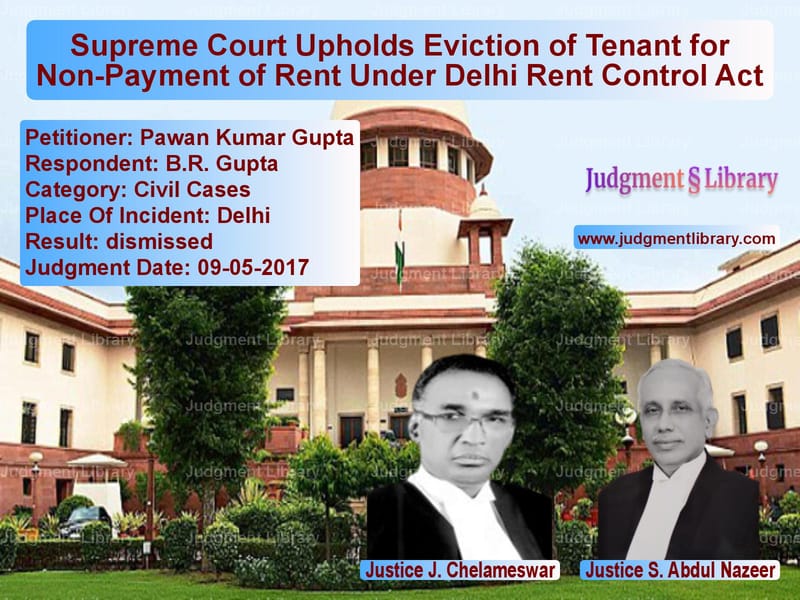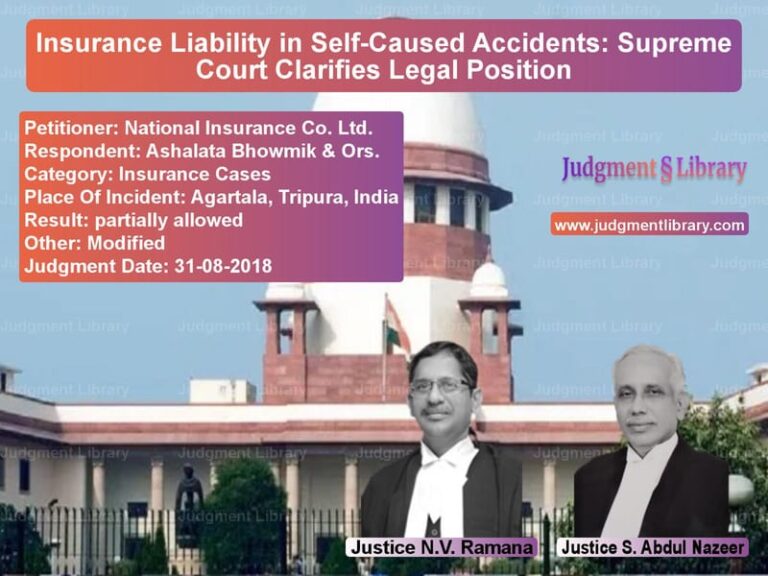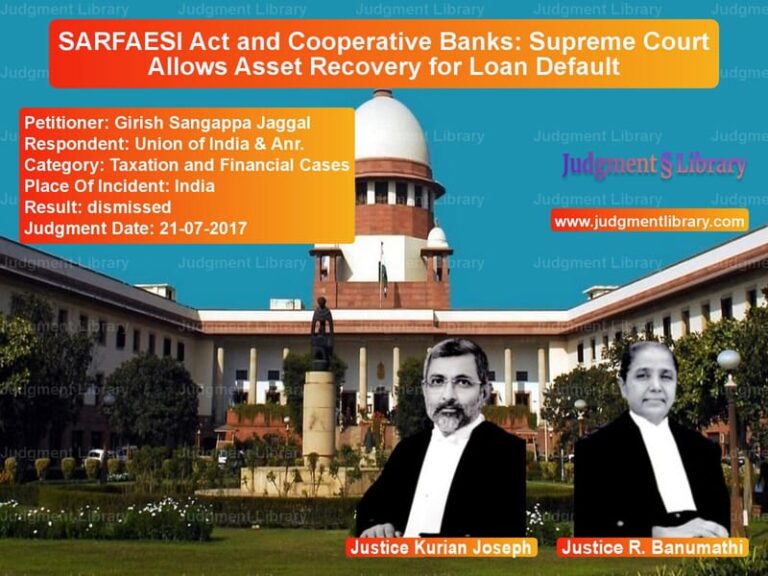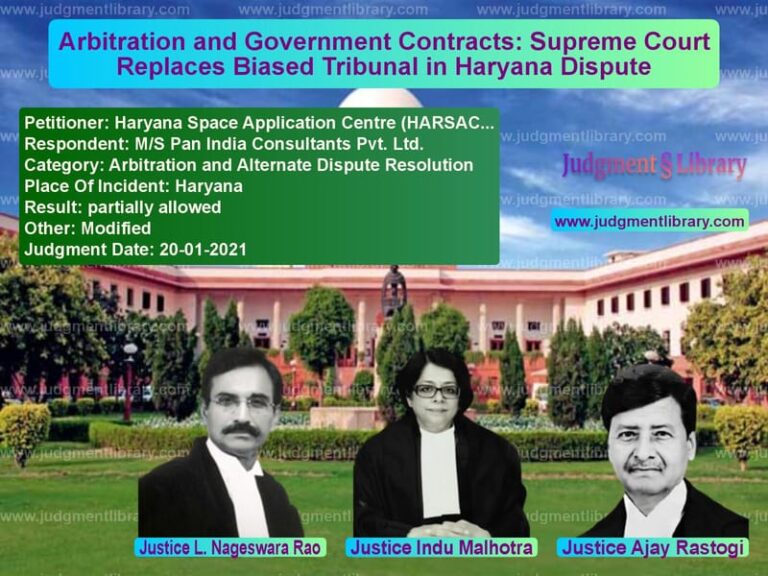Supreme Court Upholds Eviction of Tenant for Non-Payment of Rent Under Delhi Rent Control Act
The Supreme Court in Pawan Kumar Gupta vs. B.R. Gupta addressed a significant issue concerning the eviction of a tenant for non-payment of rent under the Delhi Rent Control Act, 1958. The case revolved around whether the tenant had defaulted in rent payment and whether the benefit under Section 14(2) of the Act could be granted.
Background of the Case
The respondent-landlord filed an eviction petition under Sections 14(1)(a), (b), (d), and (h) of the Delhi Rent Control Act, 1958, against the appellant-tenant before the Additional Rent Controller, Tis Hazari Courts, Delhi. The eviction was sought for the premises located at 47, 1st Floor, Bungalow Road, Kamla Nagar, Delhi. The landlord alleged that the tenant had not paid the rent despite a demand notice being issued.
Initially, multiple grounds were cited for eviction, but the case ultimately proceeded under Section 14(1)(a), which deals with non-payment of rent. The landlord claimed that the last paid rent was Rs. 500 per month, exclusive of other charges, and a demand notice was issued on January 19, 2004, for rent due since April 1, 2001.
Legal Issues Involved
1. Default in Rent Payment Under Section 14(1)(a)
The main issue was whether the tenant had defaulted in rent payment and whether the eviction order was justified.
2. Tenant’s Right to Benefit Under Section 14(2)
The tenant argued that he had cleared the outstanding dues and should be granted relief from eviction under Section 14(2), which allows a tenant to avoid eviction by making the necessary rent payments.
3. Validity of Orders Passed Under Section 15(1)
The tenant claimed that the order passed by the Rent Controller on February 7, 2005, directing him to deposit rent monthly, had been modified by the order dated July 5, 2011.
Arguments Presented
Petitioner’s (Pawan Kumar Gupta) Arguments
- The tenant claimed that he had paid rent regularly but had not received receipts from the landlord.
- A sum of Rs. 18,000 was paid by bank draft for the period from April 1, 2001, to September 30, 2004.
- The order passed under Section 15(1) directing rent deposit was modified on July 5, 2011, and this should be considered as compliance.
- The High Court erred in relying on Hem Chand vs. Delhi Cloth & General Mills when subsequent rulings had given Rent Controllers discretionary power to condone delay in rent payment.
Respondent’s (B.R. Gupta) Arguments
- The tenant had defaulted on rent payments despite receiving a demand notice dated January 19, 2004.
- The order under Section 15(1) required the tenant to deposit Rs. 500 per month starting from October 1, 2004, but the tenant had failed to comply.
- The tenant made payments for January 2004 to January 2006 after a delay of 9 months and 12 days, and for April 2006 to March 2007 after a delay of 3 months and 6 days.
- Since the tenant consistently defaulted, he was not entitled to relief under Section 14(2).
Supreme Court’s Observations
The Supreme Court made the following observations:
- The tenant had received a demand notice but failed to pay the arrears of rent within two months, as required under Section 14(1)(a).
- The Rent Controller’s order dated February 7, 2005, was valid and binding on the tenant.
- The claim that the July 5, 2011, order had modified the February 7, 2005, order was incorrect.
- The tenant failed to comply with rent deposit orders and could not claim benefit under Section 14(2).
Key Verbal Arguments by the Court
“The first contention of the learned senior counsel for the tenant is that the order dated 07.02.2005 passed under Section 15(1) of the Act has been modified by the Rent Controller by his order dated 05.07.2011. Therefore, the Rent Controller was not justified in passing an order of eviction for non-payment of rent in terms of the order dated 7th February 2005. There is no merit in this contention.”
“The tenant is a willful defaulter of rents. He took a stand before the Rent Controller that he had paid the entire arrears of rent. The Rent Controller passed an order under Section 15(1) directing him to deposit rent from 1.10.2004 onwards, which he failed to do.”
“Condonation of delay can take place only when the defaulting tenant pleads justifiable reasons showing that he was prevented from compliance by circumstances beyond his control. The tenant has not offered any explanation for the delay in deposit of rents.”
Final Judgment
The Supreme Court ruled:
- The appeal was dismissed.
- The order of the Delhi High Court upholding the eviction was affirmed.
- The tenant was granted three months to vacate the premises, subject to an undertaking before the Supreme Court.
- Failure to comply would result in forced eviction.
- No costs were imposed on either party.
Significance of the Judgment
This ruling has important implications for tenancy disputes:
- It reinforces that tenants must pay rent regularly and comply with court orders.
- It upholds that non-payment of rent justifies eviction under Section 14(1)(a) of the Delhi Rent Control Act.
- It clarifies that courts will strictly enforce orders under Section 15(1) for rent deposit compliance.
Conclusion
The Supreme Court’s judgment in Pawan Kumar Gupta vs. B.R. Gupta sets a crucial precedent for landlord-tenant disputes. By enforcing strict compliance with rent deposit requirements, the ruling protects the rights of landlords while ensuring that tenants meet their financial obligations.
Don’t miss out on the full details! Download the complete judgment in PDF format below and gain valuable insights instantly!
Download Judgment: Pawan Kumar Gupta vs B.R. Gupta Supreme Court of India Judgment Dated 09-05-2017.pdf
Direct Downlaod Judgment: Direct downlaod this Judgment
See all petitions in Property Disputes
See all petitions in Landlord-Tenant Disputes
See all petitions in Damages and Compensation
See all petitions in Judgment by J. Chelameswar
See all petitions in Judgment by S. Abdul Nazeer
See all petitions in dismissed
See all petitions in supreme court of India judgments May 2017
See all petitions in 2017 judgments
See all posts in Civil Cases Category
See all allowed petitions in Civil Cases Category
See all Dismissed petitions in Civil Cases Category
See all partially allowed petitions in Civil Cases Category







